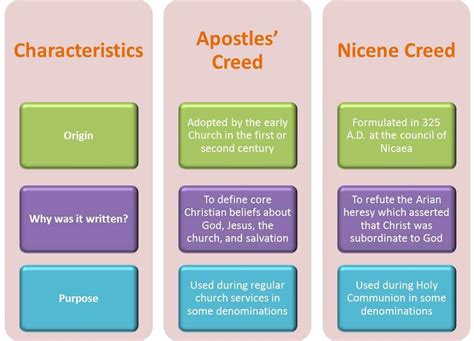The Nicene Creed and the Apostles' Creed are two of the most widely recognized and recited creeds in the Christian faith. While both creeds are used to affirm the fundamental beliefs of Christianity, they have distinct differences in their origins, structures, and emphases. In this article, we will delve into the history and development of both creeds, highlighting their key differences and exploring their significance in the Christian tradition.
Origins and Development

The Apostles' Creed is the older of the two creeds, with its origins dating back to the 2nd century. It is believed to have been written by the apostles themselves, although the exact authorship is unknown. The creed was likely developed as a baptismal formula, summarizing the essential teachings of Christianity for new believers.
In contrast, the Nicene Creed was formulated in the 4th century, specifically in 325 AD, at the Council of Nicaea. This council was convened by Emperor Constantine to address the controversy surrounding the nature of Christ, sparked by the teachings of Arius. The Nicene Creed was created to affirm the divinity of Christ and to provide a clear statement of faith for the Church.
Structure and Content
One of the most noticeable differences between the two creeds is their structure and content. The Apostles' Creed is shorter, consisting of 12 articles, while the Nicene Creed has 14 articles.
The Apostles' Creed begins with a statement of faith in God the Father, followed by affirmations of Jesus Christ, the Holy Spirit, the Church, and the resurrection of the body. The creed ends with a declaration of faith in the forgiveness of sins and eternal life.
The Nicene Creed, on the other hand, begins with a statement of faith in one God, followed by a detailed affirmation of the divinity of Christ, including his birth, crucifixion, and resurrection. The creed also includes a statement on the Holy Spirit and the Church, before concluding with a declaration of faith in the resurrection of the dead and eternal life.
Key Differences
So, what are the key differences between the Nicene Creed and the Apostles' Creed? Here are some of the main distinctions:
- Length and detail: The Nicene Creed is longer and more detailed, providing a more comprehensive statement of faith.
- Emphasis on Christ's divinity: The Nicene Creed places a strong emphasis on the divinity of Christ, affirming his co-eternality with the Father and his role as the Son of God.
- Language and terminology: The Nicene Creed uses more precise and technical language, reflecting the theological debates of the 4th century.
- Baptismal focus: The Apostles' Creed has a stronger focus on baptism, with its articles summarizing the essential teachings of Christianity for new believers.
Significance and Use
Both creeds have played significant roles in the Christian tradition, serving as powerful statements of faith and affirmations of doctrine. The Apostles' Creed is often recited during baptismal services, while the Nicene Creed is commonly used in liturgical worship, particularly in the Eastern Orthodox and Roman Catholic traditions.
In addition to their liturgical use, both creeds have been used as tools for catechesis and evangelism, providing a clear and concise summary of Christian doctrine.






Conclusion
In conclusion, while both the Nicene Creed and the Apostles' Creed are essential statements of faith in the Christian tradition, they have distinct differences in their origins, structures, and emphases. Understanding these differences can deepen our appreciation for the rich history and theology of the Christian faith.
As we continue to recite and reflect on these creeds, may we be reminded of the importance of affirming our faith and upholding the fundamental teachings of Christianity.
We invite you to share your thoughts on the Nicene Creed and the Apostles' Creed in the comments below. How do you think these creeds continue to shape our understanding of Christianity today?
What is the main difference between the Nicene Creed and the Apostles' Creed?
+The main difference between the two creeds is their length and emphasis. The Nicene Creed is longer and places a strong emphasis on the divinity of Christ, while the Apostles' Creed is shorter and has a stronger focus on baptism.
What is the significance of the Nicene Creed in the Christian tradition?
+The Nicene Creed is significant because it provides a clear and comprehensive statement of faith, affirming the divinity of Christ and the Holy Spirit. It has been used in liturgical worship for centuries and continues to be an important tool for catechesis and evangelism.
How are the Apostles' Creed and the Nicene Creed used in modern worship?
+The Apostles' Creed is often recited during baptismal services, while the Nicene Creed is commonly used in liturgical worship, particularly in the Eastern Orthodox and Roman Catholic traditions.
